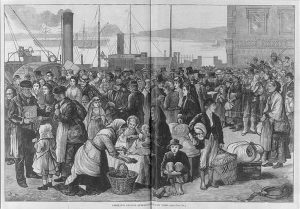Monthly talk: Marcus Paul – Ireland to the Wild West
I was intrigued by the title of our guest speaker’s talk in August, so I was particularly looking forward to hearing what Marcus Paul had to say. I was not disappointed.
 Mr Paul used a collection of letters sold at an auction house in New York as a springboard for research into the lives of a remarkable husband and wife team of Victorian travellers and adventurers. These letters were written over many years by Agnes Kinnear Wilson to her sister in Edinburgh about her travels and experiences in America with her husband, James.
Mr Paul used a collection of letters sold at an auction house in New York as a springboard for research into the lives of a remarkable husband and wife team of Victorian travellers and adventurers. These letters were written over many years by Agnes Kinnear Wilson to her sister in Edinburgh about her travels and experiences in America with her husband, James.
James left rural Ireland in the 1840s, like countless others, to escape the ‘Great Hunger’ and grinding poverty. He travelled to the United States, studied at Princeton, returned to Scotland to study theology, and met his future wife Agnes. Together they moved back to the United States where they settled in New Jersey where James was a minister to a group of churches and was clearly highly regarded.
Agnes was brought up in what might be regarded as a quintessential cultivated and prosperous Edinburgh family. Her life with James took them to places and a life which could hardly be further removed from her home circumstances. Philadelphia and the East Coast of the United States were developing rapidly, and her letters home gave fascinating insights into that exciting and dynamic new world.
The early economic development of the United States was largely on the east coast but there was a restless urge by people that we might describe now as ‘economic migrants’ to expand westwards, and especially after the end of the Civil War from the 1860s. New territories and states were being settled, and there were seemingly boundless opportunities for those prepared to ‘go west’. The government gave incentives to buy land at very low prices to settle in new states such as Kansas. James, from a poor farming family in Ireland, was attracted to go to farm the land but also to follow his vocation as a minister of religion to the settlers of the region.
Agnes’s letters record the rigours of travelling by the new railways and tell us enormous amounts about the practical realities and inconveniences – and great dangers – of this experience. Distances were daunting and there were no established time  zones as people moved west. Railways had primitive facilities, the gauges of the many competing railway companies were often incompatible and so passengers had to change trains regularly. Confusion reigned. (This photograph shows a train crossing the featureless plains of Kansas in 1867.) Agnes was travelling without James for much of the time, and had to carry all her luggage together with her two year old child and a baby just a few months old – but she had no pram! She told her sister of the challenge of caring for a baby in 100 degree temperatures with no opportunity to keep milk and other food cool. Child mortality was frighteningly high but her children both survived.
zones as people moved west. Railways had primitive facilities, the gauges of the many competing railway companies were often incompatible and so passengers had to change trains regularly. Confusion reigned. (This photograph shows a train crossing the featureless plains of Kansas in 1867.) Agnes was travelling without James for much of the time, and had to carry all her luggage together with her two year old child and a baby just a few months old – but she had no pram! She told her sister of the challenge of caring for a baby in 100 degree temperatures with no opportunity to keep milk and other food cool. Child mortality was frighteningly high but her children both survived.
For those living in these remote and isolated farms, with other settlers scattered across the vast, ‘empty’ Great Plains, life was tough. The challenge of making a success of the farm was great enough, but the region presented other hazards. We have all seen ‘westerns’ with cowboys and Indians in conflict, but even films made more with a more sensitive and  enlightened perspective rarely give an adequate explanation of the realities of life in the Wild West. Mr Paul gave a very clear analysis of the three great movements of peoples across the region. There were the native American nations whose home were these great plains and whose whole culture depended on their relationship with their environment and its wildlife, and especially bison. Meanwhile, the ‘cowboys’ were moving vast herds of cattle up from the south to meet the newly constructed railways to take them to the west coast, while the new settlers just wanted to farm their lands and did not welcome movements of large numbers of cattle and herdsmen across their lands. It was a recipe for violence and disorder, and for many years there was almost no effective law enforcement.
enlightened perspective rarely give an adequate explanation of the realities of life in the Wild West. Mr Paul gave a very clear analysis of the three great movements of peoples across the region. There were the native American nations whose home were these great plains and whose whole culture depended on their relationship with their environment and its wildlife, and especially bison. Meanwhile, the ‘cowboys’ were moving vast herds of cattle up from the south to meet the newly constructed railways to take them to the west coast, while the new settlers just wanted to farm their lands and did not welcome movements of large numbers of cattle and herdsmen across their lands. It was a recipe for violence and disorder, and for many years there was almost no effective law enforcement.
The history of this period is littered with broken treaties, bad faith and slaughter – of people and bison – which is truly shocking. As we know, the losers were undoubtedly the native American peoples who were essentially victims of genocide. At one stage her family was forced to flee in fear of their lives as war broke out with the ‘Indians’, and Agnes’s letters do not suggest that her views of the treatment of the historic inhabitants of the region were out of step with most other Americans.
Mr Paul had so much to share about his research and how he did his research. He is a very accomplished speaker and no-one in his audience seemed concerned that he overran the normal time allotted to our speakers! I am now looking forward to reading his book, Ireland to the Wild West as I am certain there are so many more tales to tell.
John Vick
